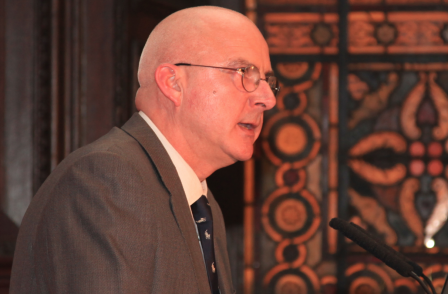
The Times journalist who uncovered the Rotherham child abuse scandal has said under Section 40 it would be “inconceivable” that the paper would have run its front-page story naming one of the abusers.
Andrew Norfolk also said Section 40 represented the first time in his 27-year career as a journalist that legislation would “actually make it near impossible to do my job”.
The Government is currently consulting on whether to enact Section 40 of the Crime and Courts Act which states news publishers would be liable to pay the legal fees of both sides if taken to court unless they are signed up to a Royal Charter-recognised regulator. The consultation closes on 10 January.
Impress has official recognition under the Royal Charter process. The Independent Press Standards Organisation, which represents the majority of news publishers, has said it will not apply for recognition.
Speaking on the BBC Radio 4 Media Show, Norfolk said: “Although the public may sometimes believe we just shove anything in a newspaper that we see fit to print, the hurdles that we have to go over in order to get to a position of publishing an article that makes such a serious allegation against one individual are very high and last a long time.
“They involve an awful lot of meetings with lawyers. They lead to some key decisions being taken about what we can safely publish without risking huge libel damages.
“When we take that risk, like we did in naming this man, we do so because we believe we have the information that enables us to support every single sentence that is going to be written about that man and to defend it if necessary in court.
“If section 40 comes in, it is inconceivable that we would even have published that article in the first place.”
He added: “I think it is inconceivable that [publishers becoming more risk averse] wouldn’t be the inevitable outcome [of section 40 being commenced]. Each decision is a balancing exercise. It’s a decision: can we defend this? because if we can we will not have to pay the costs because we will win the case.
“If there’s an in-built guarantee that we will have to pay the costs of both cases even if we win, how can that not affect a decision taken by a commercial media organisation, no matter how deep its pockets?”
Former Labour home secretary and phone-hacking victim Lord Blunkett also spoke out on the show against Section 40 coming into effect.
He said: “It’s actually a ridiculous situation for local and regional newspapers where people will be able to take them on knowing that the press will have to pick up the tab, whether the individual wins or loses, and that is a massive hole in the system.
“So Section 40 is important for the reasons you have described. It is the foundation, the lynch pin, but it’s flawed.”
He added: “I know there’s a campaign going on [against section 40]. No I’m not comfortable [being a part of it] but that doesn’t stop me from believing that there’s a very good left of centre, liberal argument for a free press and to try and find a solution that isn’t even more detrimental to that print media which somehow we need to hang on to.”
Hacked Off campaigner and professor of communications at Westminster University, Steven Barnett, said he had no sympathy for the argument that Section 40 would chill investigative journalism.
Speaking in reference to the Times investigation into the Rotherham sex abuse ring, he said: “All that publication needs to do is join a recognised regulator and not only would they be protected from for that story but they would protected for stories like Jimmy Saville who they argued they couldn’t tackle when he was doing his worst.
“Incidentally the NUJ [National Union of Journalists] which speaks for 50 to 60,000 journalists supports Section 40 and so does Sir Harold Evans, patron of Index on Censorship (IoC), so does Tom Stoppard – there are free speech advocates who realise the good that it can do.”
Jodie Ginsbourg, chief executive of Index on Censorship, said: “The reasons why organisations like Index, which is not just a free expression body but also a publisher which would be subject to Section 40, will not join a regulator like Impress is because we don’t believe that the state should have any involvement in regulation whatsoever and it doesn’t matter how much Hacked Off talks about the fact that the Press Recognition Panel Royal Charter are arms length – there shouldn’t be a fingernail of state involvement in regulation of the press.
“It’s fundamental to an independent media and we argue for it in many countries and it’s very important that we argue for it here too.”
Email pged@pressgazette.co.uk to point out mistakes, provide story tips or send in a letter for publication on our "Letters Page" blog
